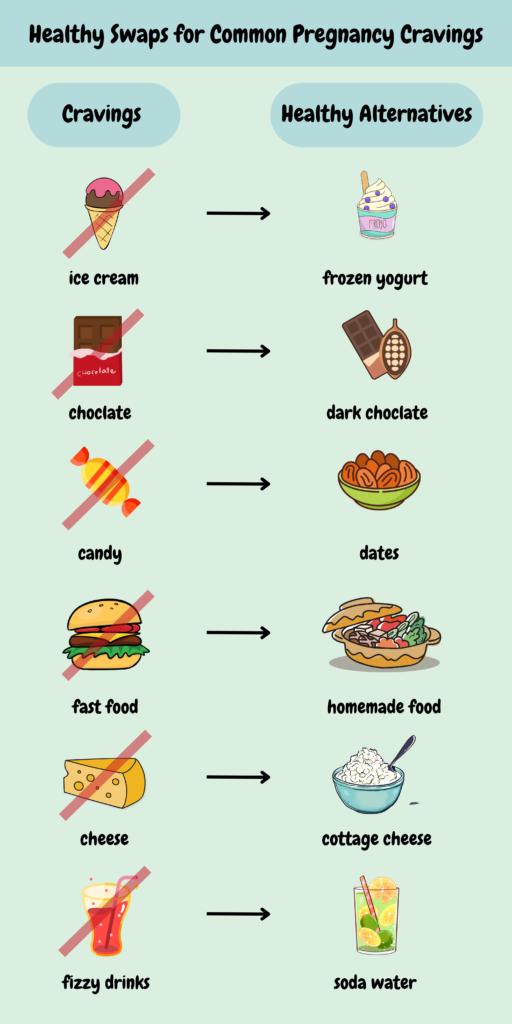Pregnancy Cravings
Pregnancy cravings are a commonly experienced by many pregnant mothers, often distinguished by strong desires for specific foods or flavours. These cravings can range from sweet to savoury, and they may be influenced by hormonal changes, nutritional needs, or even psychological factors. While some women might crave traditional foods, others may find themselves wanting unusual combinations, like pickles and ice cream. Cravings can vary significantly from one pregnancy to another, and even from one trimester to the next. It’s essential for pregnant women to maintain a balanced diet, ensuring they receive the necessary nutrients for both their health and the development of their baby.
On this page
1. What causes Pregnancy Cravings?
Pregnancy cravings can be due to several factors:
- Hormonal Changes: Fluctuations in hormones, particularly estrogen and progesterone, can affect taste and smell, leading to heightened cravings for certain foods.
- Nutritional Needs: As the body goes under significant changes, it may crave specific nutrients. For example, cravings for dairy might indicate a need for calcium.
- Psychological Factors: Emotional and psychological changes during pregnancy can also play a role. Comfort foods may be craved as a way to cope with stress or anxiety.
- Increased Appetite: As the body requires more energy to support the growing fetus, some women may experience an overall increase in appetite, leading to cravings for various foods.
- Cultural Influences: Social and cultural influences can shape food preferences, with certain cravings being influenced by family traditions or societal norms.
Overall, cravings play a complex role of biological, psychological, and cultural factors.
2. When do Pregnancy Cravings start?
Pregnancy cravings usually start in the first trimester, often around the 5th to 6th week, although this can vary in different individuals. Some women may experience cravings even earlier, while others may not notice till the second trimester. The intensity and types of cravings can vary throughout the pregnancy, often getting higher during the second trimester and sometimes decreasing in the third. Each woman’s experience is unique, so the timing and nature of cravings can differ significantly.
3. Common Pregnancy Cravings
Common pregnancy cravings can vary widely, but some of the most frequently reported ones include:
- Pickles: A classic craving, often due to their salty and tangy flavour.
- Ice Cream: Many women crave sweet, creamy treats for a quick energy boost.
- Chocolate: The rich taste and texture of chocolate can be particularly appealing.
- Fruits: Fresh fruits, especially citrus varieties like oranges or strawberries, are often craved for their sweetness and hydration.
- Savoury Snacks: Foods like chips, popcorn may be craved for their crunch and saltiness.
- Spicy Foods: Some women find themselves craving spicier dishes.
- Dairy Products: Items like cheese and yogurt might be craved for their calcium content and creamy texture.
- Carbohydrates: Foods like bread, pasta, and rice can be appealing.
These cravings can be influenced by hormonal changes, nutritional needs, and personal preferences.
4. What to do about your Pregnancy Cravings?
Pregnancy cravings can be managed in several ways:
- Listen to Your Body: If you crave something, it’s often your body telling a need. You should listen to your body and look for the healthier options.
- Opt for Healthier Alternatives: If you’re craving something unhealthy, try to find healthier versions. For example, if you want ice cream, try instead yogurt or frozen fruit.
- Stay Hydrated: Sometimes, cravings can be confused with thirst. Drinking plenty of water may help reduce some cravings.
- Eat Regularly: Eating small, balanced meals throughout the day can maintain your blood sugar and reduce intense cravings.
- Satisfy Wisely: If you crave something specific, enjoy it in moderation. For example, if you want chocolate, have a small piece.
- Focus on Nutrients: Ensure your diet is rich in essential nutrients. Deficiency of certain nutrients can also lead to intense cravings, so adding a variety of fruits, vegetables, whole grains, and proteins can be useful.
- Mindful Eating: Pay attention to why you’re craving certain foods. Sometimes cravings can be emotional, so practicing mindfulness can help you understand and address those feelings.
- Consult a Professional: If cravings are excessive or you’re unsure about your nutritional needs, consider talking to a healthcare provider advice.
Ultimately, balance is the key in managing pregnancy cravings while ensuring both your health and that of your baby.
5. Healthy swaps for common food cravings during Pregnancy?

6. Do all women get food cravings?
Not all women experience food cravings during pregnancy. While many do report intense cravings, others may not have them at all, or their cravings may be mild. The experience of cravings can vary widely based on individual factors, including hormonal changes, nutritional needs, personal preferences, and psychological influences. Some women might also have aversions to certain foods instead. Overall, cravings are common but not universal in pregnancy.
7. When to be concerned about wired pregnancy cravings?
It’s generally normal to experience unusual pregnancy cravings, but there are certain situations where you might want to be concerned:
- Pica: This is the craving for non-food items, such as dirt, chalk, or soap. If you find yourself wanting to eat non-food substances, it’s important to discuss this with your healthcare provider.
- Excessive Cravings: If your cravings are extremely intense and lead to overeating or an unhealthy diet, this could affect your health and that of your baby.
- Nutritional Deficiencies: If you’re craving specific foods that are unusual or outside of a balanced diet, it may indicate a nutritional deficiency. Consult your doctor for this.
- Persistent Nausea or Discomfort: If cravings are accompanied by persistent nausea, vomiting, or gastrointestinal distress, it’s important discussing with your healthcare provider.
- Mood Changes: If cravings are linked to significant mood swings or emotional distress, seeking guidance from a professional may be helpful.
- Weight Gain Concerns: If you’re gaining weight too rapidly due to cravings, consult your healthcare provider to ensure your diet remains healthy.
If you’re ever in doubt about your cravings or any related symptoms, it’s always best to reach out to your healthcare provider for personal advice.

